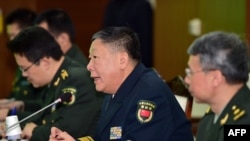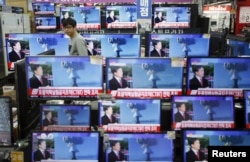Cooperation among the United States, South Korea and China is key to international efforts to denuclearize the Korean Peninsula, a former U.S. envoy who led nuclear negotiations with North Korea said.
While international talks over how to achieve the denuclearization have remained deadlocked for many years, Pyongyang appears to have made progress on its nuclear weapons program. Last week, the communist country conducted its fourth nuclear test.
Christopher Hill, former U.S. assistant secretary of state, told VOA on Thursday that the three countries should not "allow North Koreans to create any divisions" among them, saying the countries hold "keys" to resolving the issue.
Hill led the U.S. delegation that reached a nuclear deal with North Korea in September 2005, where Pyongyang pledged to abandon all nuclear weapons and existing nuclear programs in return for economic aid and other incentives.
Trilateral cooperation necessary
The former envoy said China is an "important element" of sanctions on North Korea. However, Hill added, the international community and China appear to disagree on how much leverage Beijing is using on Pyongyang.
Beijing believes it is using more than enough leverage against its ally, but many countries see it as inadequate, according to Hill.
On Friday, Beijing said it would support the U.N. sanctions against Pyongyang. This was the first time Beijing had publicly expressed its support for the U.N. action in response to Pyongyang's nuclear test.
At the same time, the latest nuclear test sparked criticism that the Obama administration's containment policy of "strategic patience" has failed to stop Pyongyang's nuclear development. Some critics have suggested Washington should steer its focus toward preventing Pyongyang's nuclear proliferation, instead of seeking complete denuclearization.
Bill Richardson, former U.S. ambassador to the U.N., told VOA this week that the U.S. should pursue a deal with North Korea that would scale back Pyongyang's nuclear program.
"I think we need to change our policy like we did with Iran," Richardson said.
Hill dismissed the idea as unrealistic.
"I don't believe there's any real prospect of containing North Korea's nuclear programs at some low level of programs. I think they must be discontinued," said the envoy.
Technical requirements
When asked about why Kim Jong Un might have chosen this time to conduct the test, the former diplomat cited "internal technical matters," in reference to necessary steps required for Pyongyang's nuclear weapons program.
"I think it probably had to do with a testing program his military has set out," Hill said.
He added that North Korea's internal politics also might have played a role in Kim's decision.
"I think the testing program, which enrages the rest of the world, actually is perceived in North Korea as a sign of Kim Jong Un's strength," Hill said.
The United States and North Korea have been at odds over Pyongyang's nuclear development since the early 1990s. Multistate talks involving the United States, China, Russia, Japan and two Koreas have ended in failure. The last round of the talks was held in late 2008.
VOA’s Jee Abbey Lee contributed to this report.














